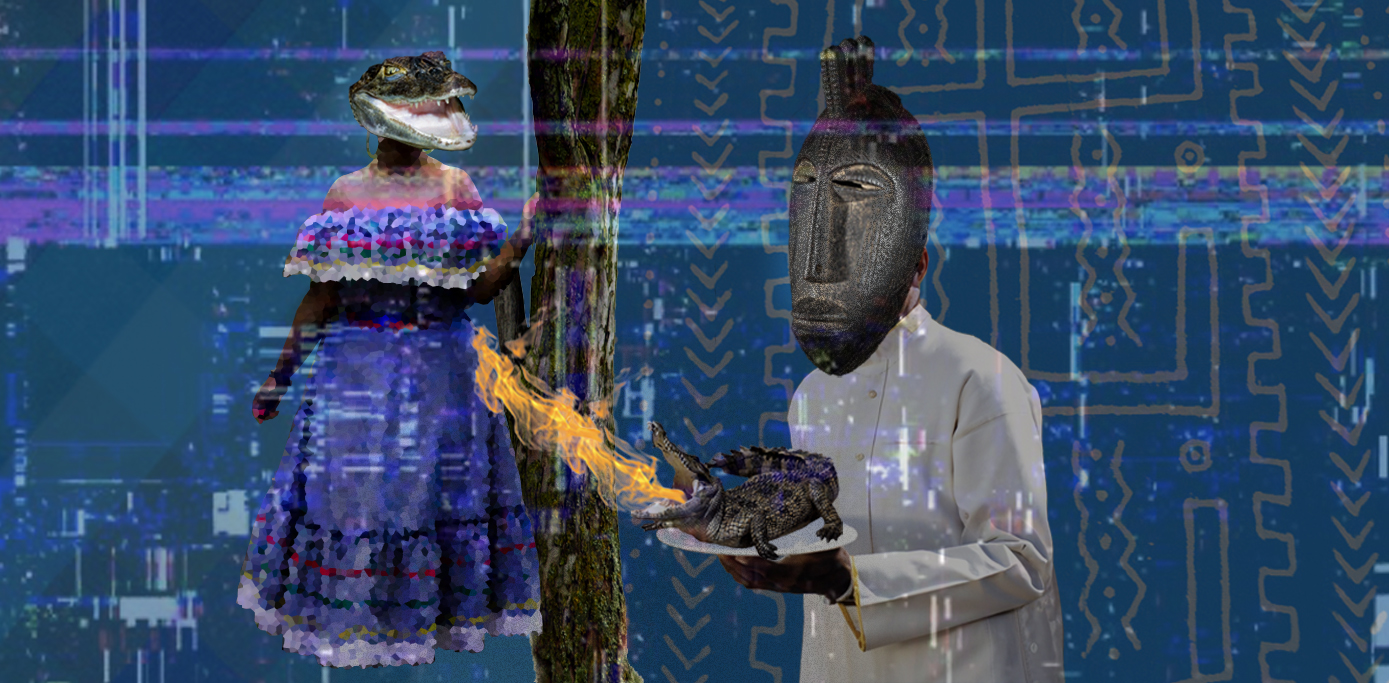colonial glitch, afrofuturistic overtake
amilton de azevedo writes about Survival Technologies, by Kamissa Ma Koïta, Elena Stoodley and PME-ART (Canada), premiered in the 2024 Festival TransAmériques (FTA – Tiohtià:ké/Montreal). this text is part of a special coverage; the critic traveled to Canada at the invitation of the FTA.
“The rivers, these beings that have always inhabited the world in different ways, are those who suggest to me that, if there is a future to be considered, this future is ancestral, because it was already here.” [Ailton Krenak in Futuro Ancestral (Ancestral Future), in a free translation]
“For each one has the right to find the mystery of what it is for them to belong, in kindness and gestures of silence, drum beats and life-celebrating chants.” [Luiz Antonio Simas in Pedrinhas miudinhas (Tiny little rocks), in a free translation]
Jean Durandisse goes into the stage and introduces himself and one of the central Survival Technologies (Canada, 2024) to be presented throughout the performance: dance. Karl-Henry Brézault drum beats and Elena Stoodley, Michèle Jean Jacques, Sophia Gaspard and Durandisse bodies are put in motion while chanting vivid songs. Kamissa Ma Koïta visual creation starts to suffer some interference. Colonialism is an insistent glitch and afrofuturistic dreams are the tools for the overtake.
Religion, western culture, the modern idea of progress: the cycle continues to repeat itself, in many disguises and perspectives, from the first encounter of Europe with otherness and up until our days. Audre Lorde wrote that “the master’s tools will never dismantle the master’s house“; Survival Technologies is about relying and trusting in ancestral knowledge and practice as a means to build a proper future.
- Read more: access this link for more theater critics written in english
- Read more: follow ruína acesa’s FTA special coverage
Survival Technologies is also about responding to the danger by appropriating and resignifying them. It is known that data-based algorithms are biased, often acting in racist ways and whilst stepping into an AI-shaped world it is impossible not to reflect upon such questions. The idea of the internet’s equality and horizontality is being perceived more and more as an illusion. And if there is something that colonialism is quite expertised on is captivating everything as a weapon for its violence and maintenance.
Ma Koïta visualities present not only the glitches but also the deformation of the imagination caused by ill-intentional use of such technologies. As Brézault drum beats meets Stoodley’s MPC-based compositions through her voice and he joins her with wind instruments, ancestry and contemporality are one; even if the master’s tools won’t dismantle the master’s house, this doesn’t mean that they should not be used: Survival Technologies is about taking everything in, leaving nothing out. Giving it back as a resistance perspective, but also realizing that sharing is caring and the anticolonial struggle is a global issue.
The five performers, then, contemplate a possible future with beauties and dreams of their own. As Fernando Birri, argentinian director, once said in a quote made famous by uruguayan author Eduardo Galeano, “utopia is on the horizon. I move two steps closer; it moves two steps further away. I walk another ten steps and the horizon runs ten steps further away. As much as I may walk, I’ll never reach it. So what’s the point of utopia? The point is this: to keep walking“. To keep walking towards the horizon, the ultimate survival technology.

